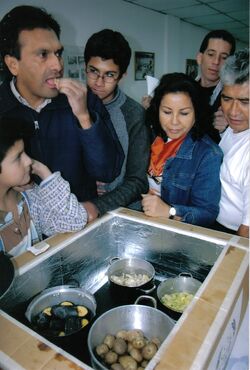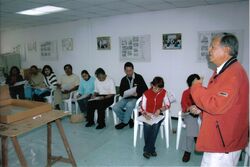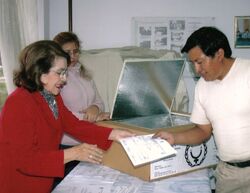m (→Contact: Cat change) |
Ben Hedrick (talk | contribs) mNo edit summary |
||
| (5 intermediate revisions by 2 users not shown) | |||
| Line 1: | Line 1: | ||
| + | {{GoogleTranslateLinks}} |
||
| ⚫ | [[Image:Fabiola_Cuvi.jpg| |
||
| + | {{Updated|10|15|12}} |
||
| ⚫ | [[Image:Fabiola_Cuvi.jpg|right|125px]]Dr. '''Fabiola Cuvi''', Director of the '''Ecuadorian Research and Training Institute''' (IECAIM), reports that the institute continues to expand its solar program. In July, IECAIM held its 49th training course on the methodology, construction and use of solar cookers. Dr. Cuvi says that the students were very happy and surprised that inexpensive, cardboard box-type solar cookers work so well. The course ended with a solar feast of fish, potatoes, bananas and broccoli. |
||
| ⚫ | |||
[[IECAIM]] is a national focal point of [[INSTRAW]] (the United Nation’s International Institute of Research and Training for the Advance of Women). It is an autonomous national organization, which was founded in 1986. In August 1989, IECAIM initiated a training program for rural women designed to provide a practical solution to the problem of deforestation in [[Ecuador]]’s countryside. In collaboration with INSTRAW and [[Solar Cookers International]], IECAIM conducts training courses for rural women that enable them to utilize new sources of energy in their agricultural and household tasks. The participants, rural women belonging to the “comunas campesinas” are instructed in the use of alternative energy sources, such as solar, biomass, geothermal, etc. Participants also learn how to construct simple devices that save energy and/or utilize alternative energy sources. These include: solar cookers, a grain dryer based on solar and wind energy and solar devices for the heating of water and the dwelling. IECAIM organizes and teaches the courses. |
[[IECAIM]] is a national focal point of [[INSTRAW]] (the United Nation’s International Institute of Research and Training for the Advance of Women). It is an autonomous national organization, which was founded in 1986. In August 1989, IECAIM initiated a training program for rural women designed to provide a practical solution to the problem of deforestation in [[Ecuador]]’s countryside. In collaboration with INSTRAW and [[Solar Cookers International]], IECAIM conducts training courses for rural women that enable them to utilize new sources of energy in their agricultural and household tasks. The participants, rural women belonging to the “comunas campesinas” are instructed in the use of alternative energy sources, such as solar, biomass, geothermal, etc. Participants also learn how to construct simple devices that save energy and/or utilize alternative energy sources. These include: solar cookers, a grain dryer based on solar and wind energy and solar devices for the heating of water and the dwelling. IECAIM organizes and teaches the courses. |
||
| − | [[Image: |
+ | [[Image:IECAIM September 2008.jpg|right|250px]] |
To date (September 2008) 500 people have participated in the training program. As a result, they have access to improved solar cooker stoves and grain solar dryers. The stoves save fuel and decrease women’s exposure to the noxious effects of smoke. The improved grain dryers based on solar and wind energy protect the grains from animals, rain, etc. The use of these devices that conserve fuel or utilize alternative sources of energy, decreases the necessity for travelling long distances in search of fuel wood. It also prevents deforestation, which causes so much of income-generating opportunities for participants, who may eventually earn income by constructing and selling these new devices to other women. |
To date (September 2008) 500 people have participated in the training program. As a result, they have access to improved solar cooker stoves and grain solar dryers. The stoves save fuel and decrease women’s exposure to the noxious effects of smoke. The improved grain dryers based on solar and wind energy protect the grains from animals, rain, etc. The use of these devices that conserve fuel or utilize alternative sources of energy, decreases the necessity for travelling long distances in search of fuel wood. It also prevents deforestation, which causes so much of income-generating opportunities for participants, who may eventually earn income by constructing and selling these new devices to other women. |
||
In addition in Quito, Ecuador, at the equator, the centre of the world, in South America, IECAIM initiated the project on technology, construction and commercialization of solar cookers that is benefiting 400 women and their families. They construct and sell the solar cookers. |
In addition in Quito, Ecuador, at the equator, the centre of the world, in South America, IECAIM initiated the project on technology, construction and commercialization of solar cookers that is benefiting 400 women and their families. They construct and sell the solar cookers. |
||
| ⚫ | |||
==News and recent developments== |
==News and recent developments== |
||
| − | *'''September 2008:''' Fabiola Cuvi reports: "Our Institute was founded in 1986, and it has been working with solar cookers since 1992. |
+ | *'''September 2008:''' Fabiola Cuvi reports: "Our Institute was founded in 1986, and it has been working with solar cookers since 1992. We have carried out 135 courses on "Methodology Construction and Use of the Solar Cookers". Five hundred women have benefited from this technology. On the last course we performed in our Institute, we had 21 students, both women and men. It was a successful event. Everybody was happy and admired the efficiency of the solar cooker. This solar cooker cooked all the foods that we put to cook. I was the Director, and [[Rodrigo Carpio]] was the teacher who taught how to build a solar cooker." |
[[Image:Fabiola_Cuvi3.jpg|thumb|right|250px]] |
[[Image:Fabiola_Cuvi3.jpg|thumb|right|250px]] |
||
==Audio and video== |
==Audio and video== |
||
| Line 16: | Line 18: | ||
==See also== |
==See also== |
||
* [[Media:Granada06_Fabiola_Cuvi.pdf|A paper presented by Fabiola Cuvi at the 2006 Granada solar cooking conference]] |
* [[Media:Granada06_Fabiola_Cuvi.pdf|A paper presented by Fabiola Cuvi at the 2006 Granada solar cooking conference]] |
||
| + | * [[Instituto Ecuatoriano de Investigaciones y Capacitacion de la Mujer]] |
||
==Contact== |
==Contact== |
||
| − | Dr. Fabiola Cuvi<br> |
+ | Dr. Fabiola Cuvi<br /> |
| − | IECAIM<br> |
+ | IECAIM<br /> |
| − | Av. 6 de Diciembre 2817 Y Republica<br> |
+ | Av. 6 de Diciembre 2817 Y Republica<br /> |
| − | Quito<br> |
+ | Quito<br /> |
[[Ecuador]] |
[[Ecuador]] |
||
| − | Tel: (593-2) 2 525517<br> |
+ | Tel: (593-2) 2 525517<br /> |
Fax: (593-2) 2 569397 |
Fax: (593-2) 2 569397 |
||
| − | [mailto: |
+ | Email: [mailto:fabi-cuvi@hotmail.com fabi-cuvi@hotmail.com]<br /> |
| − | http://www.iecaim.org |
+ | Web: http://www.iecaim.org |
[[Category:Individuals|Cuvi]] |
[[Category:Individuals|Cuvi]] |
||
[[Category:Ecuador|Cuvi]] |
[[Category:Ecuador|Cuvi]] |
||
| − | [[Category:Solar Cookers |
+ | [[Category:Solar Cookers International Network members|Cuvi]] |
Revision as of 21:45, 27 March 2014
|
Last edited: 15 October 2012
|
Dr. Fabiola Cuvi, Director of the Ecuadorian Research and Training Institute (IECAIM), reports that the institute continues to expand its solar program. In July, IECAIM held its 49th training course on the methodology, construction and use of solar cookers. Dr. Cuvi says that the students were very happy and surprised that inexpensive, cardboard box-type solar cookers work so well. The course ended with a solar feast of fish, potatoes, bananas and broccoli.
IECAIM is a national focal point of INSTRAW (the United Nation’s International Institute of Research and Training for the Advance of Women). It is an autonomous national organization, which was founded in 1986. In August 1989, IECAIM initiated a training program for rural women designed to provide a practical solution to the problem of deforestation in Ecuador’s countryside. In collaboration with INSTRAW and Solar Cookers International, IECAIM conducts training courses for rural women that enable them to utilize new sources of energy in their agricultural and household tasks. The participants, rural women belonging to the “comunas campesinas” are instructed in the use of alternative energy sources, such as solar, biomass, geothermal, etc. Participants also learn how to construct simple devices that save energy and/or utilize alternative energy sources. These include: solar cookers, a grain dryer based on solar and wind energy and solar devices for the heating of water and the dwelling. IECAIM organizes and teaches the courses.
To date (September 2008) 500 people have participated in the training program. As a result, they have access to improved solar cooker stoves and grain solar dryers. The stoves save fuel and decrease women’s exposure to the noxious effects of smoke. The improved grain dryers based on solar and wind energy protect the grains from animals, rain, etc. The use of these devices that conserve fuel or utilize alternative sources of energy, decreases the necessity for travelling long distances in search of fuel wood. It also prevents deforestation, which causes so much of income-generating opportunities for participants, who may eventually earn income by constructing and selling these new devices to other women.
In addition in Quito, Ecuador, at the equator, the centre of the world, in South America, IECAIM initiated the project on technology, construction and commercialization of solar cookers that is benefiting 400 women and their families. They construct and sell the solar cookers.
News and recent developments
- September 2008: Fabiola Cuvi reports: "Our Institute was founded in 1986, and it has been working with solar cookers since 1992. We have carried out 135 courses on "Methodology Construction and Use of the Solar Cookers". Five hundred women have benefited from this technology. On the last course we performed in our Institute, we had 21 students, both women and men. It was a successful event. Everybody was happy and admired the efficiency of the solar cooker. This solar cooker cooked all the foods that we put to cook. I was the Director, and Rodrigo Carpio was the teacher who taught how to build a solar cooker."

Audio and video
- July 2006: Audio interview in Spanish with Fabiola Cuvi
See also
- A paper presented by Fabiola Cuvi at the 2006 Granada solar cooking conference
- Instituto Ecuatoriano de Investigaciones y Capacitacion de la Mujer
Contact
Dr. Fabiola Cuvi
IECAIM
Av. 6 de Diciembre 2817 Y Republica
Quito
Ecuador
Tel: (593-2) 2 525517
Fax: (593-2) 2 569397
Email: fabi-cuvi@hotmail.com
Web: http://www.iecaim.org



